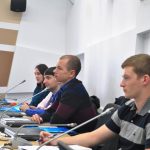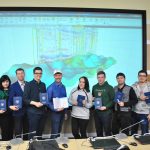EOR methods
Acquisition of theoretical knowledge in oilfield development using enhanced oil recovery methods
Course description:
Upon completion of this advanced training course, students will gain knowledge of the theoretical and practical aspects of enhanced oil recovery methods, criteria for their applicability and technical limitations.
The course examines in detail the properties of rocks, reservoir fluids, the basics of displacement, the concept of capillary number, mixing and immiscible processes.
Students of the course will study the features of polymer flooding, the physical foundations of alkaline, surfactant and polymer flooding, thermal processes, and will also consider the analysis of production decline curves, reservoir simulation modeling.
Category of trainees:
Managers and specialists of Oil and Gas E&P Companies
Training Language:
English or Russian
| No. | Name of sections and topics | Total Hours | Lectures | Practical studies |
| 1. | Enhanced oil recovery methods | 36 | 26 | 10 |
| 1.1 | Introduction to EOR methods. | 2 | 2 | 2 |
| Applicability Criteria and Technical Limitations. | ||||
| 1.2 | Rock properties, reservoir fluids, displacement basics, capillary number concept. | 2 | 2 | |
| 1.3 | Miscible and non-miscible processes: gas injection, alternating water and gas injection (WAG), data acquisition requirements and workflows. | 2 | 2 | |
| 1.4 | Polymer flooding: applications, polymer fluid rheology, polymer absorption, modeling | 2 | 2 | |
| 1.5 | Physical principles: alkaline, surfactant and polymer flooding. | 2 | 2 | |
| 1.6 | Thermal processes: Cyclic and continuous steam injection, ground facilities, thermal properties of liquid and solid phases, heat loss estimation, performance prediction and correlation. | 2 | 2 | |
| 1.7 | Evaluation of enhanced oil recovery characteristics: case studies and exercises. | 2 | 2 | |
| 1.8 | Reservoir properties of rocks. | 2 | 2 | |
| 1.9 | Physicochemical properties of fluids. | 2 | 2 | |
| 1.10 | Development stages. | 8 | 6 | 2 |
| Enhanced oil recovery methods. | ||||
| 1.11 | Oil fields development. | 2 | 2 | |
| 1.12 | Factor-based method for calculating the recovery factor. | 2 | 2 | |
| 1.13 | Analysis of production decline curves. | 2 | 2 | |
| 1.14 | Reservoir simulation modeling. | 2 | 2 | |
| 1.15 | Characteristics of field development projects. | 2 | 2 | |
| 2. | Distance learning | 2 | ||
| Final assessment | 2 | |||
| Total: | 40 |
“Well-equipped classrooms and great organization of training.”
“Interesting and qualified teachers”.
«Excellent organization of the educational process, all teachers with extensive experience.»
Training is conducted at the Institute of Geology and Petroleum Technologies at the following address: Kremlyovskaya str., 4/5, Kazan, Russia.
We can provide accommodation assistance for non-resident students in order to book KFU campus / hotel rooms.
In addition to the program, there are coffee breaks and excursions in the Museum of History of Kazan University, the Geological Museum named after A.A. Stukenberg and the Kazan Kremlin.



